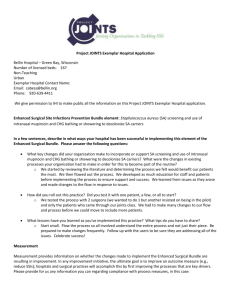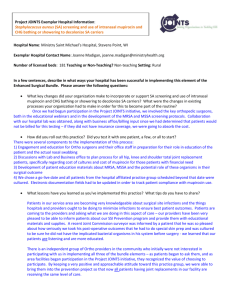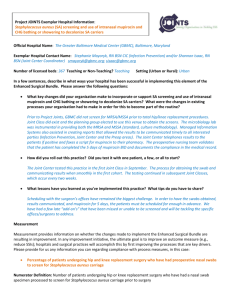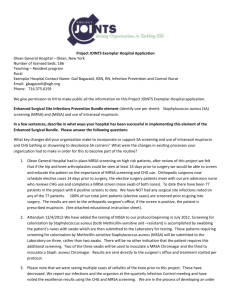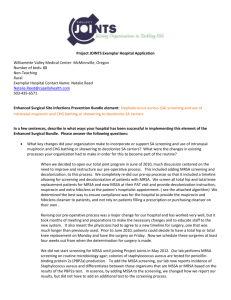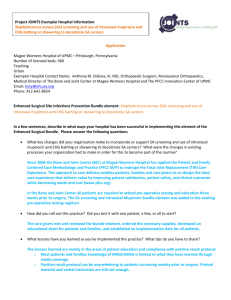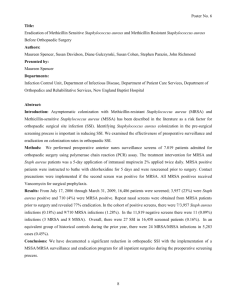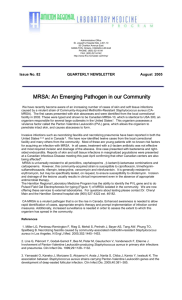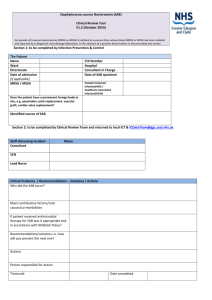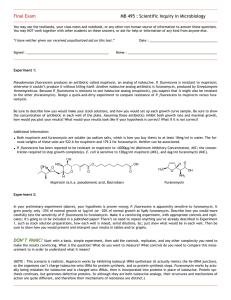Carroll Hospital - Westminster, MD
advertisement
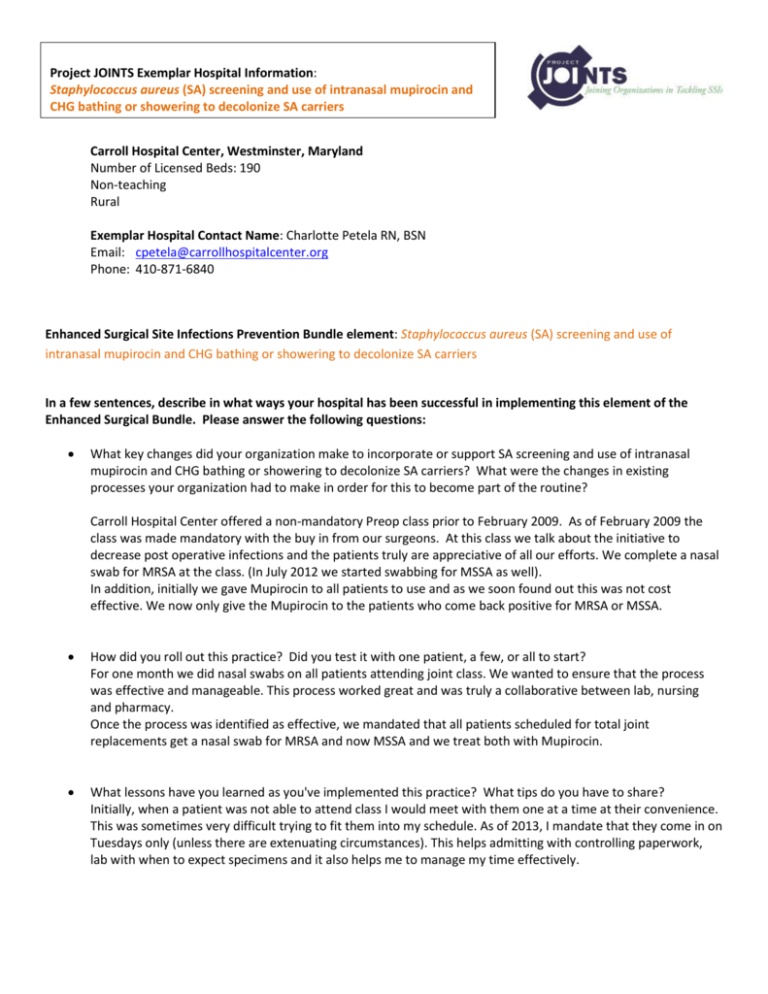
Project JOINTS Exemplar Hospital Information: Staphylococcus aureus (SA) screening and use of intranasal mupirocin and CHG bathing or showering to decolonize SA carriers Carroll Hospital Center, Westminster, Maryland Number of Licensed Beds: 190 Non-teaching Rural Exemplar Hospital Contact Name: Charlotte Petela RN, BSN Email: cpetela@carrollhospitalcenter.org Phone: 410-871-6840 Enhanced Surgical Site Infections Prevention Bundle element: Staphylococcus aureus (SA) screening and use of intranasal mupirocin and CHG bathing or showering to decolonize SA carriers In a few sentences, describe in what ways your hospital has been successful in implementing this element of the Enhanced Surgical Bundle. Please answer the following questions: What key changes did your organization make to incorporate or support SA screening and use of intranasal mupirocin and CHG bathing or showering to decolonize SA carriers? What were the changes in existing processes your organization had to make in order for this to become part of the routine? Carroll Hospital Center offered a non-mandatory Preop class prior to February 2009. As of February 2009 the class was made mandatory with the buy in from our surgeons. At this class we talk about the initiative to decrease post operative infections and the patients truly are appreciative of all our efforts. We complete a nasal swab for MRSA at the class. (In July 2012 we started swabbing for MSSA as well). In addition, initially we gave Mupirocin to all patients to use and as we soon found out this was not cost effective. We now only give the Mupirocin to the patients who come back positive for MRSA or MSSA. How did you roll out this practice? Did you test it with one patient, a few, or all to start? For one month we did nasal swabs on all patients attending joint class. We wanted to ensure that the process was effective and manageable. This process worked great and was truly a collaborative between lab, nursing and pharmacy. Once the process was identified as effective, we mandated that all patients scheduled for total joint replacements get a nasal swab for MRSA and now MSSA and we treat both with Mupirocin. What lessons have you learned as you've implemented this practice? What tips do you have to share? Initially, when a patient was not able to attend class I would meet with them one at a time at their convenience. This was sometimes very difficult trying to fit them into my schedule. As of 2013, I mandate that they come in on Tuesdays only (unless there are extenuating circumstances). This helps admitting with controlling paperwork, lab with when to expect specimens and it also helps me to manage my time effectively. Measurement Measurement provides information on whether the changes made to implement the Enhanced Surgical Bundle are resulting in improvement. In any improvement initiative, the ultimate goal is to improve an outcome measure (e.g., reduce SSIs); hospitals and surgical practices will accomplish this by first improving the processes that are key drivers. Please provide for us any information you can regarding compliance with process measures, in this case: Percentage of patients undergoing hip and knee replacement surgery who have had preoperative nasal swabs to screen for Staphylococcus aureus carriage [screening measure] Numerator Definition: Number of patients undergoing hip or knee replacement surgery who have had a nasal swab specimen processed to screen for Staphylococcus aureus carriage prior to surgery Denominator Definition: Number of patients undergoing elective hip or knee replacement surgery All of our patients have had the nasal swabbing as a preoperative screening. (100 %) Percentage of patients undergoing hip and knee replacement surgery with nasal swabs positive for Staphylococcus aureus who have received five days of intranasal mupirocin prior to surgery [received mupirocin measure] Numerator Definition: Number of patients undergoing hip or knee replacement surgery with a nasal swab specimen result indicating Staphylococcus aureus carriage who have received five days of intranasal mupirocin prior to surgery Denominator Definition: Number of patients undergoing elective hip or knee replacement surgery with nasal swabs positive for Staphylococcus aureus When we started the program in 2009 all patients were given the mupiricin to use for 5 days prior to surgery. In 2011 we changed our practice to give mupiricin only to patients who were positive for MRSA or MSSA. 1-1-11 through 12-31-11: MRSA + 17/455 screened = 3.7 % For 1-1-12 through 12-31-12: MRSA = 25/487 screened = 5.1% Since we didn't do MSSA Screening until 7/24/12 I used 8/12 through 12/12 data MSSA 44+/201 screened=21.89% NOTE: Please attach available data in any format you currently have in the email included with this application.
